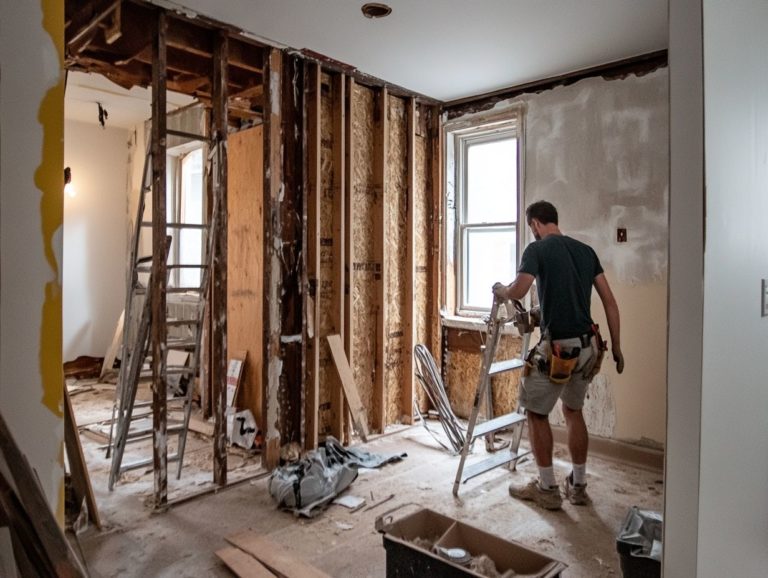How to Save on Home Insurance Costs?
Home insurance safeguards your property, but understanding its costs can feel overwhelming. Factors like your home’s location and safety features influence your premiums.
This article explores home insurance costs and effective strategies for saving money. Learn how comparison shopping, maximizing discounts, and improving your home s security can lead to significant savings.
You’ll find practical tips to lower your overall insurance expenses. Protect your home without breaking the bank!
Contents
Key Takeaways:

- Shop around for the best home insurance rates.
- Maximize savings by bundling policies and maintaining a good credit score.
- Consider home improvements to lower insurance costs.
Understanding Home Insurance Costs
Understanding home insurance costs is important for homeowners. It helps you make informed decisions about your coverage.
Factors affecting your rates include your property’s value, location, claims history, and the insurer’s financial strength. Each aspect can greatly influence your insurance costs.
Consider your deductible options and liability coverage to tailor your policy. Analyzing these factors helps you navigate homeowners insurance effectively and secure the best rates.
Factors that Affect Home Insurance Premiums
Various factors determine your home insurance premiums, including property age, location, and credit history. These can cause noticeable differences in costs.
Home improvements, like upgrading wiring or reinforcing your roof, can also impact premiums. Such upgrades increase your property’s value and reduce risks, making it cheaper to insure.
Implement safety measures to further reduce your insurance costs. For example, installing fire alarms or smart locks can enhance security, showcasing a proactive approach to risk management.
Insurance companies appreciate these enhancements and may reward you with lower premiums, benefiting you as you invest in your property’s safety.
Ways to Save on Home Insurance
You can save on homeowners insurance by leveraging various discounts offered by providers. This can lead to significantly lower premiums.
Common discounts include:
- Claims-free records
- Newly purchased homes
- Multi-policy bundling
Building a solid claims history and being loyal to your provider can unlock even more savings, improving your financial situation.
Comparison Shopping for the Best Rates
Comparison shopping is essential for homeowners seeking the best rates. It allows you to evaluate quotes from multiple companies based on their strengths and customer experiences.
Using comparison platforms helps you find policies tailored to your needs, ensuring you choose options that excel in both coverage and cost.
Reading customer reviews on sites like Trustpilot and Yelp provides valuable insights into a company’s reputation. These reviews can offer real-life experiences that help you assess service quality and claims efficiency.
This thorough evaluation enables you to make informed decisions and secure an insurance plan that aligns with your unique circumstances.
Maximizing Discounts and Savings

Maximizing discounts and savings on homeowners insurance requires you to be proactive in identifying and leveraging the available opportunities. For example, you can benefit from claims-free discounts and save money if you bundle different types of insurance together.
By understanding many options you can choose from, you can also explore investing in smart devices that enhance your daily living while potentially leading to significant reductions in your insurance premiums.
For instance, installing a smart home security system complete with surveillance cameras, motion detectors, and smart locks can signal to insurers that your home is less likely to be targeted by burglars.
Smart thermostats help you monitor energy use, which may qualify you for energy efficiency discounts.
Never underestimate the power of communicating with your insurance provider. By doing so, you can uncover all eligible discounts and ultimately tap into substantial savings.
Improving Your Home’s Safety and Security
Want to save money on your home insurance? Start by making your home safer! Enhancing your home’s safety and security is essential, not just for safeguarding your property, but also for significantly reducing your homeowners insurance premiums. If you notice any changes in your rates, consider learning what to do when home insurance rates rise.
By implementing advanced safety measures and effective risk reduction strategies, you can enjoy peace of mind while optimizing your financial investment.
Investing in Home Security Systems
Investing in a home security system is a proactive step that not only enhances your safety but also qualifies you for significant insurance discounts. This promotes both peace of mind and financial savings.
These systems come in various forms, from straightforward alarm setups to sophisticated smart home integrations featuring surveillance cameras, motion detectors, and smart locks.
Many of them provide mobile alerts, remote monitoring, and seamless integration with other smart devices, enabling you to manage your home’s safety from virtually anywhere.
By implementing a robust home security system, you deter potential break-ins and substantially reduce the risk of loss or damage. This can lead to lower insurance premiums, as insurers often reward homeowners who take security seriously.
Whether you’re a homebuyer or a current owner, prioritizing security can secure you better rates and comprehensive coverage, underscoring the importance of these systems in your financial planning.
Making Home Improvements for Risk Reduction
Making home improvements, especially renovations aimed at reducing risk factors, can significantly lower your insurance costs while enhancing the safety and value of your property.
By concentrating on critical areas, such as updating outdated plumbing and electrical systems, you not only mitigate potential hazards but also position yourself for more favorable insurance premiums.
For example, installing modern wiring can greatly reduce the risk of electrical fires, while replacing old pipes can prevent leaks and water damage.
Both of these actions not only protect your property but also signal to insurance providers your commitment to minimizing risk, which could lead to lower annual rates.
These renovations also contribute to a more efficient home, further boosting its marketability in today s competitive real estate landscape.
Tips for Lowering Home Insurance Costs
You can effectively lower your home insurance costs by implementing a range of strategies. Consider what to do before buying home insurance, such as selecting the right deductible options; a deductible is the amount you pay out of pocket before your insurance kicks in. Additionally, maintaining a favorable claims history is crucial, as both factors significantly influence your insurance premiums.
Maintaining a Good Credit Score

Maintaining a good credit score is crucial for homeowners, as it can significantly influence your insurance rates and the range of coverage options available from various providers. A higher credit score often translates to lower premiums, with insurers viewing individuals with strong credit histories as less risky to insure.
This connection highlights the importance of financial responsibility; a poor credit score can lead to increased costs or even challenges in securing essential coverage.
To ensure your credit remains in good standing, prioritize the following:
- Pay your bills on time
- Reduce outstanding debt
- Regularly check your credit reports for any discrepancies
Additionally, establishing a credit mix by responsibly managing different types of credit can further enhance your overall credit health, ultimately making your insurance more affordable.
Don’t leave money on the table! Start implementing these tips today to lower your home insurance costs and protect your investment.
Adjusting Coverage and Deductibles
Adjusting coverage and deductible options is a strategic move that allows you to customize your home insurance policy while potentially lowering your rates and premiums.
By carefully considering the balance between coverage and deductibles, you can take charge of your insurance costs! Consider this: increasing your deductible from $500 to $1,000 may lead to a significant reduction in your monthly premiums. However, this means you’ll need to cover a larger upfront cost in the event of a claim.
Conversely, choosing higher coverage limits enhances your protection, but it may also result in increased premiums. Evaluate your specific needs, local risks, and financial situation to find the right combination that safeguards your assets while keeping your insurance expenses manageable.
Bundling Insurance Policies
Bundling your insurance policies with a single provider can unlock impressive multi-policy discounts, providing you with a smart way to reduce premiums while simplifying your insurance management.
By consolidating your home insurance with your auto coverage, you not only streamline your financial commitments but also tap into significant savings. Many insurers reward customers for combining these key policies, resulting in overall lower costs.
Beyond the financial perks, this approach offers you a single point of contact for claims and inquiries, making for a smoother experience during those high-stress moments. Having everything under one roof often translates to more comprehensive protection and personalized customer service.
For busy homeowners like you, bundling is an appealing choice, maximizing efficiency in your insurance needs.
Frequently Asked Questions
How can I lower my home insurance costs?
There are several ways to save on home insurance costs, such as increasing your deductible, bundling your policies, and understanding what to do before getting home insurance, including installing safety features in your home.
Is it possible to negotiate home insurance rates?

Yes, you can negotiate your home insurance rates by comparing quotes from different insurance providers and leveraging any discounts or promotions offered.
What discounts are available for home insurance?
Some common discounts for home insurance include multi-policy discounts, claim-free discounts, and discounts for installing safety features in your home.
Should I review my insurance coverage regularly?
It is recommended to review your insurance coverage annually or whenever there are major changes to your home or belongings. This ensures you have adequate coverage and are not overpaying for unnecessary coverage.
How can I find the best home insurance rates?
The best way to find the best home insurance rates is to shop around and compare quotes from multiple insurance providers. Think about working with an independent insurance agent for tailored support.
What factors affect home insurance costs?
Several factors can affect your home insurance costs, including the age and condition of your home, location, coverage amount, and any past claims or risks associated with your property. Your credit score and insurance history may also be taken into consideration.






